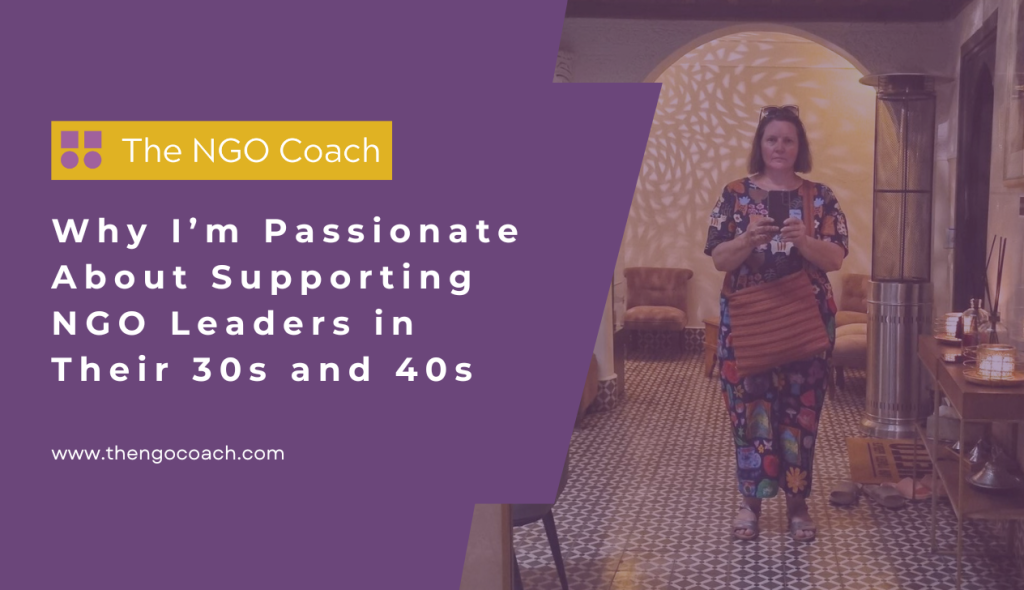In the world of NGO leadership, early to mid-career leaders in their 30s and 40s often feel like they’re navigating uncharted waters. They’re in critical nonprofit roles, tasked with leading change in increasingly complex times, yet they’re often left without role models they truly resonate with.
As The NGO Coach, I’ve seen first-hand how much leaders in this age group contribute to their organisations and their communities. My passion for supporting them comes from both a deep understanding of their challenges and a belief that they are the key to building sustainable systems for the future.
Let’s unpack why this matters so much.
The Leadership Gap: Searching for Role Models
Many leaders in their 30s and 40s struggle to find older leaders whose style and approach they want to emulate.
- Generation X and Baby Boomer Leaders Don’t Always Fit: Older leaders often represent models of leadership that no longer serve the needs of today. Traditional, top-down hierarchies may have worked in the past, but the challenges of the modern world demand a new kind of leadership.
- New Generations Lead Differently: Younger leaders are bringing in innovative approaches. They value collaboration over competition, flexibility over rigidity, and cross-cultural perspectives over narrow viewpoints.
- We’re Shifting Beyond Old Hierarchies: Today’s challenges – from climate change to equity and inclusion – need leadership models that empower and include, not command and control.
Leaders in their 30s and 40s are stepping into this gap, reimagining leadership for a rapidly changing world.
A System Built for the Future, Not the Past
We can’t build a system for our grandchildren using structures designed by our grandparents. Our world has changed dramatically, and so must the way we lead.
Here’s what I believe this generation of leaders needs to focus on:
- Tech-Enabled Leadership: Using technology to collaborate, solve problems, and connect across boundaries. Technology helps NGOs amplify their voices, streamline operations, and stay ahead of the curve.
- Globalised Worldviews: Today’s problems are interconnected. Leaders need to think beyond local or national boundaries, embracing global perspectives to find innovative solutions.
- Cross-Cultural Thinking: The best answers often come from inclusive, diverse teams. Leaders must learn to honour and integrate cultural knowledge and ways of working, particularly here in Aotearoa New Zealand, where Māori, Pacific and Ethnic frameworks offer powerful solutions.
This is the kind of leadership that will build sustainable organisations and systems for generations to come.
Leading Through Complexity
NGO leaders in their 30s and 40s are operating in a time of unprecedented complexity.
- Funding streams are tighter and more competitive.
- Global issues, like climate change and inequality, feel overwhelming.
- Kamahi / staff and tūao / volunteers are stretched thin.
- Communities and funders are demanding more accountability, transparency, and impact.
It’s a lot to hold – and yet, these NGO leaders are showing up every day with heart, courage, and determination.
Why This Matters to Me
I’m passionate about supporting NGO leaders in their 30s and 40s because I see their potential to shape the future. They bring fresh energy, bold ideas, and a willingness to do things differently. They are:
- Ready to lead with purpose and innovation.
- Capable of building collaborative, inclusive kaimahi / teams.
- Committed to tackling the big problems of our time.
But they can’t do it alone. They need the right support, tools, and spaces to grow as NGO leaders – and that’s where I come in.
A New Kind of Leadership
The old leadership models no longer serve us. We’re moving beyond outdated hierarchies and command-and-control styles to something better:
- Leadership that’s collaborative, not competitive.
- Kamahi / teams that are diverse, empowered, and aligned.
- Organisations that are agile, sustainable, and connected to their communities.
This is how we build a system that works for everyone – now and in the future.
If You’re a Leader in Your 30s or 40s, Let’s Talk
I believe in you and the mahi / work you’re doing. Together, we can:
- Explore leadership tools that work for today’s challenges.
- Build practices to keep you energised and sustainable.
- Create a vision for the future that’s bold, inclusive, and impactful.
The world needs your leadership. Let’s make sure you have the support you need to thrive.
Meri Kirihimete me te Hape Nū Ia” (e kī ana te Pākehā).

